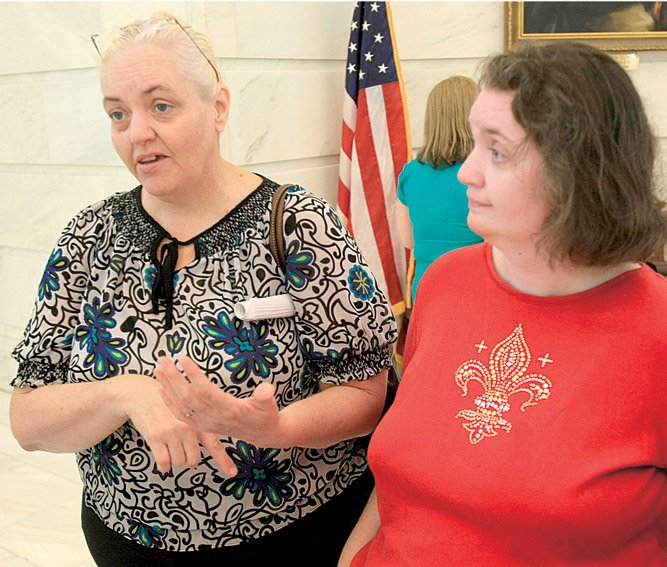LITTLE ROCK — Advocates for the disabled called on Gov. Mike Beebe to close the Booneville Human Development Center, saying Tuesday that residents have long been neglected and denied basic rights.
They cited several problems over the past three years, including the choking death last month of a resident who was supposed to be supervised.
The center is the responsibility of the state Department of Human Services.
“Gov. Beebe and DHS, please hear us,” said Dana McClain, senior attorney with the Disability Rights Center in Little Rock. “We have waited long enough, and we’ll be silent no longer.”
Beebe spokesman Matt DeCample said the governor has no plans to close the Booneville center because he “favors choices” for families,including both large, state run institutions and community programs.
The governor has ordered a review of five of the state’s centers for developmentally disabled adults and the closure of a sixth, the Alexander Human Development Center, because of facility-wide problems.
Asked whether the review might trigger the closure of the Booneville center, De-Cample said, “I don’t think you rule anything out, but right now our focus is on strengthening the services at the other five as we close down Alexander.”
Department of Human Services spokesman Darinda Sharp said officials at her agency think the Booneville center should remain open. It houses 143 people.
“There’s clearly a demand for services, and we want to strengthen the facilities that are open as opposed to closing them,” Sharp said. “We believe residents at Booneville receive good care from a committed staff.”
Ina Bailey, who removed her 34-year-old sister from the center in January, characterized the Booneville center differently.
She said employees lost her profoundly deaf sister, Christina Board, for 45 minutes in below-freezing, rainy weather. When they found her soaking wet outside, they did not send her to a hospital.
Board also spent much of her time at the center without a way to communicate, Bailey said.
When Booneville center officials told Bailey that a Level 3 sex offender had moved to the center but would be supervised, Bailey said, she decided to place her sister in a community program. Board has thrived there.
“In my opinion, Christina was abused, neglected and denied her civil rights [at the Booneville center],” Bailey said. “We’ll never place her with the state again.”
NONEXISTENT?
The call to close the center came as experts from the U.S. Department of Justice toured the Booneville facility Tuesday as part of a lawsuit alleging that the state illegally segregates disabled people in institutions.
The lawsuit is a result of the U.S. Supreme Court’s 1999 decision in Olmstead v. L.C., a ruling requiring states to eliminate unnecessary segregation of people with disabilities and to move those who can function in the community out of segregated facilities. That could include small group homes, day programs or moving people back home.
But Jan Fortney, whose daughter, Kim, is a longtime resident of the Conway Human Development Center, argues that the Olmstead decision is being misused to shut down large state facilities.
“Olmstead does not require closure of intermediate facilities, but that’s what they’d like us to believe,” said Fortney, who attended the news conference.
Her daughter is 35 but has the mind of a 2-year-old. Kim stayed at home until she was 18.
Fortney said she’s comforted knowing that her daughter lives at the Conway center because she has around-the clock care and immediate access to an infirmary.
“She gets good care, and she’s happy,” Fortney said.
Fortney and other parents who want the state to keep the human development centers open say they want “choices” and those should include human-development centers.
Keith Vire, CEO of the nonprofit Arkansas Support Network in Springdale, said during the news conference that he believes developmentally disabled people who live in institutions should move into the community. He said the state could use money it spends on centers to help create community programs and services that people need to care for their loved ones.
“It’s time for our state to take a big, hard look at the services we provide,” Vire said.
ISOLATED INCIDENT?
Disability Rights Center investigator Dee Blakely said the state also needs to re-evaluate what has been happening at the Booneville center.
Blakely pointed to the recent death of 25-year-old Booneville center resident Michael Fornell, who choked on a bologna sandwich.
Logan County investigator Ray Gack has said Fornell was under a doctor’s orders to eat only food “chopped” into small pieces because he had a history of choking.
After Fornell’s death, one employee was fired.
Human Services spokesman Julie Munsell has told the Arkansas Democrat-Gazette that Fornell’s death was an “isolated” incident, but Blakely said that’s not true.
She said the state Office of Long Term Care has found other problems, including the 2007 death of a 28-year-old resident found wedged in a window. An autopsy showed that he died of positional asphyxia.
In 2009, a profoundly mentally retarded resident went into renal and respiratory failure after a nurse gave him the wrong medications.
That was the third medication error the nurse made in 2009, according to Long Term Care. The unidentified nurse was not monitored by her supervisor after the first two mistakes.
About the same time, a moderately mentally retarded man who had been hit with a chair by another resident began complaining of pain on his left side. Three weeks passed before anyone discovered that he had broken ribs.
Munsell has said problems related to each of these cases have been addressed. Blakely disagreed.
“Isolated incident?” she asked at the news conference. “Does that mean if someone dies or is seriously injured once a year or so because staff aren’t doing their jobs, everything is OK in the eyes of DHS ?”
Arkansas, Pages 7 on 06/23/2010

